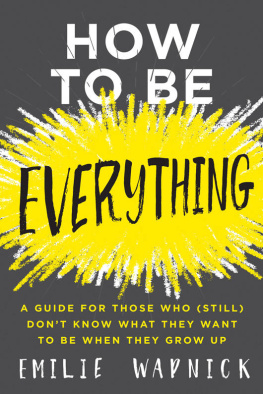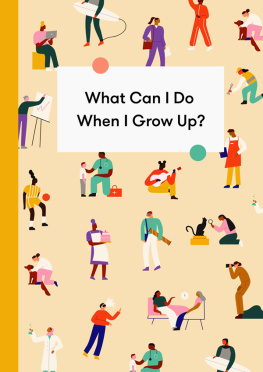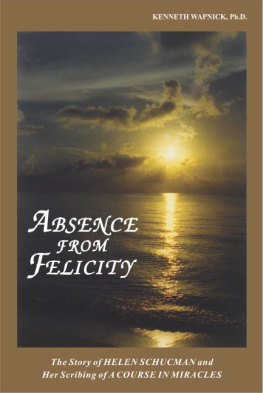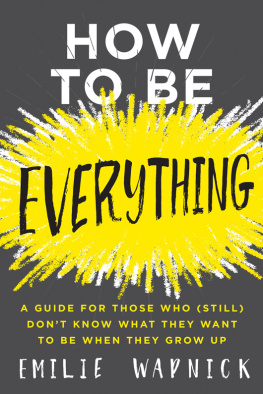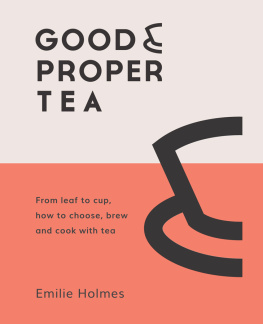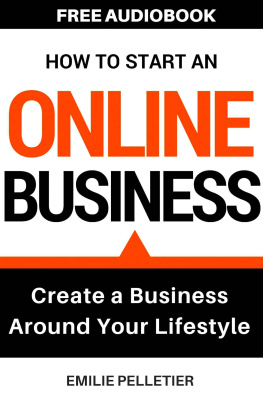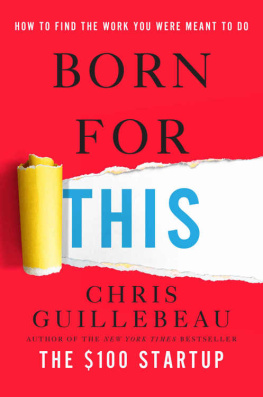FOR VALERIE
Artistry trumps mastery.
MAGGIE NELSON
CONTENTS
Guide
If you picked up this book, its probably because youve had trouble narrowing down what you want to be to one thing. Im not going to show you how to do that.
This book is for the people who dont want to pick a single focus and abandon all their other interests. Its for the curious, for those who find delight in learning new things, creating and morphing between identities.
You dont have to choose one thing. Thats the big secret no one tells you. This book will show you how to build a sustainable and fruitful career that will allow you to explore to your hearts contentto BE EVERYTHING.
Be warned, however. This is no ordinary book. And its no ordinary reading experience. Building a multifaceted life takes introspection and experimentation. Ill be here to guide you, but Im going to ask you to do some things along the way. They may or may not include the following: making a lot of lists, throwing tantrums, researching strange combinations of words.... So grab a pen, some paper, and perhaps a snazzy highlighter to mark the sentences you want to remember. This is the start of something big. And really fun.
Emilie?
I lifted my eyes from the menu at the deli. Standing before me was the acting teacher Id studied with as a teenager. It had been years since Id last seen her. We hugged and caught up a little, and she told me about how her theater school was going.
And what are you up to these days? she asked.
Im about to start law school in the fall, I replied enthusiastically. (Since taking an introductory law class the year before, Id developed a nerdy fascination with things like contracts and property law. These systems felt like an entirely new way of looking at the world.)
Her reaction was not what I expected. A funny expression materialized on her face, as she cocked her head to one side.
Hm. I thought you were going to be a filmmaker.
My heart sunk. There it was: my problem, verbalized in a single sentence.
I thought you were going to be a filmmaker.
This happened nearly a decade ago. I was twenty-three, and I was slowly beginning to observe a pattern in myself. I noticed my tendency to dive into a new field, become completely engrossed, voraciously devour every bit of related information I could get my hands on, and complete a few projects I was very passionate about. After a number of months (or years), my interest would miraculously begin to wane and I would shift toward a new and exciting field, at which point the pattern would repeat. Boredom always set in once I reached a fairly high level of proficiency. Of course, this was also the point at which people would look at me and say: Wow, Emilie, youre good at this! Youve really found your thing, havent you? Ugh. Cue the guilt. Cue the shame.
This way of being in the worldbecoming fascinated by something, diving in, gaining skills, and losing interestcaused me a lot of anxiety. Assuming that the tendency to pivot between disciplines was unique to me, I felt totally alone. My peers certainly didnt have everything figured out, but they all seemed to be on a linear trajectory toward something. My path, on the other hand, was just a mess of zigzags: music, art, web design, filmmaking, law...
When my former acting teacher told me, with apparent confusion and disappointment, that she THOUGHT I WAS GOING TO BE A FILMMAKER, it was like I crashed face-first into a Truth about myself that Id been hiding from: I was incapable of sticking with anything. That moment felt like a moment of clarity, and it did not feel good. A million questions spun in my head: Will I ever find my Thing? Do I even have a Thing? If my calling isnt any of the Things Ive tried before, will it be the next one? Will I ever be content in one job for more than a few years, or will each profession eventually lose its luster? And the most cutting question of all: If I must flit between fields in order to stay happy, will I ever amount to anything? I worried that I was, at my core, someone who couldnt commit or follow through. I was certain that there was something wrong with me.
Someone might label these thoughts frivolous, privileged, or a product of my age or (lack of) maturity at the time, but Why am I here? is a question that humans of all ages grapple with. The experience of this kind of confusionconfusion around not just career, but identity itselffeels anything but frivolous. It is paralyzing.
WHAT DO YOU WANT TO BE WHEN YOU GROW UP?
Do you remember being asked, as a little kid, what you wanted to be when you grew up? How did you feel? When I think back to when I was five or six, I dont remember my specific answer. But I do remember what happened after I answered: the face of the adult who had asked took on a look of approval and pride. It felt good to declare an identity. The world (well, my little world, at least) approved.
Something happens to many of us as we get older: What do you want to be when you grow up? goes from being a fun exercise in daydreams to a more serious, more anxiety-inducing question. We begin to feel the pressure to respond with a practical answer: one with weight and consequences, to which we will be held. We sense the people around us trying to pinpoint the type of person we are becoming, and we want the same kind of approval we were granted as little kids when we declared our desire to become circus clowns or dinosaurs.
We want all of this, but we dont want to be boxed in or to make the wrong choice. While outside forces prod us to declare a major, home in on our strengths, and find a niche, we mortals are struggling to understand who we are and what kind of significance our life will have. Its a mess of external and internal pressures, intertwined with existential and identity confusion. This mess isnt relegated to adolescence, either. For many of us, it continues throughout our lives.
THE MYTH OF THE ONE TRUE CALLING
One reason that What do you want to be... has the ability to wreak havoc in our hearts and psyches is that it implies the need to be one thing. Theres a good chance that if your five-year-old self rattled off a list of ten different future selves, the adult posing the question would say something like, Well, which is it? You cant be all of those! Certainly, once we reach adolescence, theres far less tolerance for answers like, Im going to be a marine biologist, textile artist, and journalist! Its subtle, but we can translate What do you want to be when you grow up? to You are allowed one identity in this life, so which is it? How terrifying is that? When phrased that way, its no wonder the question stresses us out.
The message that we must decide on a single identity is reinforced in many contexts. Mainstream career books and guidance counselors give us tests to help us whittle down our career options to the perfect fit. Colleges and universities ask us to declare a major. Employers sometimes ask applicants to explain ourselves when we possess skills in outside fields, implying we lack focus or ability. We receive ominous warnings from the people in our lives and the media about the dangers of being a quitter, a flake, or a jack-of-all-trades, master of none. A specialized life is portrayed as the only path to success, and its highly romanticized in our culture. Weve all heard of the doctor who always knew she wanted to be a doctor, or the writer who wrote his first novel at the age of ten. These people are held up as shining examples for the rest of us, andwhile people like this certainly exist (no hate intended to the focused few!)many of us simply dont fit into their model. Through social cues and conditioning, we learn to believe in the romantic notion of the One True Calling: the idea that we each have one great thing we are meant to do with our lifeOUR DESTINY!
Next page
